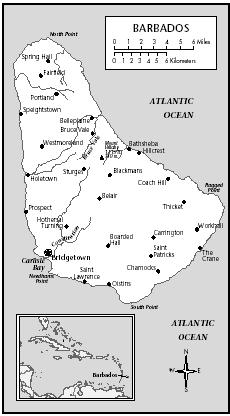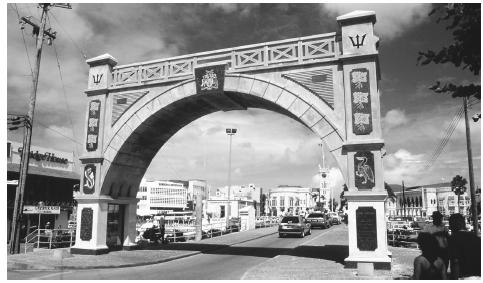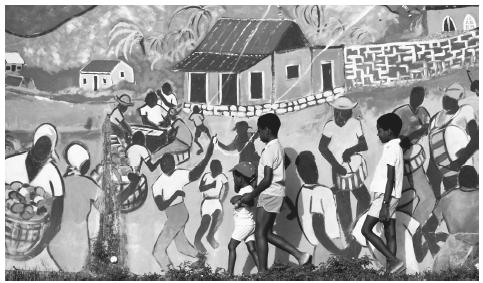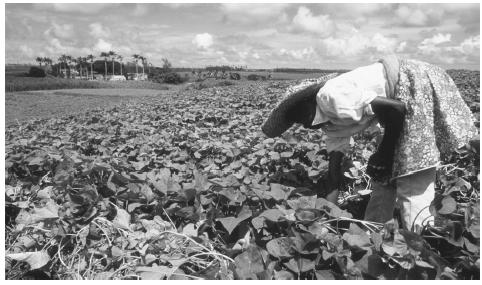Barbados
Culture Name
Barbadian
Alternative Name
Bajan
Orientation
Identification. Barbadians are people born on Barbados and people born elsewhere who have at least one Barbadian parent and maintain cultural ties to the nation. There are emigrant Barbadians communities in Canada, the United Kingdom, the United States, and Guyana that maintain active ties with their families and friends on the island. Barbadians recognize regional identities that correspond to parish districts and distinctive regional accents.
Location and Geography. Barbados is a coral limestone outcropping of the South American continental shelf that lies in the western Atlantic Ocean, one hundred miles (160 kilometers) east of the island of Saint Lucia and two hundred miles (320 kilometers) north of Trinidad and the northern coast of South America. Barbados has low, rolling hills, and microclimate variations from rain forest to semidesert.
Demography. More than 260,000 people live on this island of 166 square miles (430 square kilometers), with a population density of 1,548 people per square mile (597.7 per square kilometer) in 1996. Large populations have characterized the nation almost since its inception. As early as 1680, the island was home to seventy thousand people.
Until 1960, high birth and death rates generated a large number of young people. Barbadians emigrated in large numbers to the United Kingdom and in smaller numbers to the United States and Canada. Death rates and birth rates fell rapidly after 1960. Aided by continuing emigration among the young and immigration among the elderly, the population aged rapidly. By the year 2050, the proportion of the population age sixty-five and over will range between 25 and 33 percent of the total population.
Linguistic Affiliation. Barbadians speak a dialect of English with tonal qualities that reflect the West African heritage of the vast majority of its population. Barbadians also speak an English-West African pidgin called Bajan. The number of native Bajan speakers has declined in recent decades. Both languages have dialect differences that correspond with parish districts.
Symbolism. The flying fish serves as a national symbol.
History and Ethnic Relations
Emergence of the Nation. Barbados was colonized by the English early in the seventeenth century. The English found the island uninhabited when they landed in 1625, although archaeological findings have documented prior habitation by Carib and Arawak Native Americans. By 1650, Barbados was transformed by the plantation system and slavery into the first major monocropping sugar producer in the emerging British Empire, and its fortunes were tied to sugar and to England for the next three hundred and ten years. In 1651, Barbados won a measure of independence, and established what was to become the oldest continuing parliamentary democracy in the world outside England. This autonomy encouraged planters to remain on the island rather than returning to Europe when they made their fortunes.
National Identity. When West Indian sugar plantations disappeared elsewhere in the 1800s, Barbadian plantations remained productive. In the early twentieth century, the creation of a merchant-planter oligopoly ended the improvement in

Barbadian culture emerged out of the plantation slavery economy as a distinctive synthesis of English and West African cultural traditions. Regional, race, and class cultural variants exist, but all residents identify with the national culture.
Ethnic Relations. About 80% of all Barbadians are the descendants of former African slaves. Barbados also has a high proportion of citizens with a largely European ancestry. Barbados is generally free from ethnic tension.
Urbanism, Architecture, and the Use of Space
About 80 percent of the population lives in or around the capital, Bridgetown. The remaining 20 percent live in rural areas in settlements that vary from dispersed homes and occasional plantations to small nucleated villages.
Food and Economy
Food in Daily Life. Coocoo (a creamy blend of cornmeal and okra) and flying fish is the national dish. Breaded and fried flying fish is a popular snack or meal. Bajan meals emphasize fish, chicken, pork, and other foods common in West Africa, such as rice, okra, and Scotch bonnet peppers. Popular fruits include papaya, mangos, guava, bananas, oranges, and pineapples. Meal components such as cornmeal, salt fish, and salt beef were supplied to the original plantation labor forces. A common meal served in rural areas called privilege blends rice, okra, hot pepper, pig tail or salt beef, garlic, salt fish, and onions. Mount Gay distillery has been producing rum since 1703. Mauby, brewed from bark, sugar, and spices, is a popular drink.
Food Customs at Ceremonial Occasions. Special occasions often call for pudding and souse, the first a spicy mashed sweet potato encased in pigs belly, and boiled pig's head served with a "pickle" of onions, hot and sweet peppers, cucumbers, and lime. Jug, or jug jug, a dish consisting of pigeon, peas, stew and salt beef, onions, Guinea corn flour, and spices, is served with Christmas dishes such as boiled ham and roasted pork.
Basic Economy. The economy is fueled by the skills of a diverse population that is one of the world's most educated, with a literacy rate close to 100 percent. The currency is the Barbados dollar, which is linked to the United States dollar. Excellent public and private bus and taxi services take advantage of nearly 1,205 miles (1,650 kilometers) of roads and make it possible to move relatively cheaply around the island. The year 1960 brought a structural change in the economy marked by a decline in sugar production and the growth of industrial manufacturing and tourism. Barbados served as a tourist destination as early as the 1600s. Small numbers of tourists come from South America and other islands in the Caribbean. A significant stream comes from northwestern Europe, primarily the United Kingdom. Most tourists, however, come from the United States and Canada. In an island long known in the Caribbean as "Little England," many Barbadians now claim that its increasingly important ties to the United States have transformed the nation into "Little America."
Land Tenure and Property. Land tenure and property concepts follow precedents set in England.
Commercial Activities. Manufactured goods include garments, furniture, ceramics, pharmaceuticals, phonograph records and tapes, processed wood, and paints.
Major Industries. Light manufacturing firms produce structural components for construction, industrial gases, paper products, electronics components, and solar energy units. Barbados also refines petroleum products.
Trade. Although production declined precipitously in the last half of the twentieth century, sugar remains the major export product. Most manufactured goods are used domestically, but a small quantity is traded to other nations in the Caribbean and Latin America. Barbados carries on a small trade with North America, principally in electronic components, garments, medical supplies, and rum.
Social Stratification
Classes and Castes. Before 1960, Barbadian society consisted of a small merchant-planter elite largely of European ancestry; a slightly larger class of accountants, lawyers, medical personnel, journalists, and teachers of diverse ancestry; and a huge lower class of field laborers and domestic servants primarily of African ancestry. The elite remains about the same size but has grown much more diverse in heritage. The lower class has all but disappeared. In its place, there is now a huge middle class that encompasses everything from skilled blue-collar workers employed in manufacturing firms and hotels to a wide range of white-collar, professional, and managerial occupational groups employed directly or indirectly in the manufacturing and tourist sectors.
Political Life
Government. Barbados is an independent parliamentary democracy within the British Commonwealth. For administrative purposes, the island is divided into the city of Bridgetown and eleven parishes. The queen of England is recognized as the head of state, and the highest court of appeals is the Supreme Court of the United Kingdom. The queen appoints a governor-general to represent her on the island.
All local governments, including those on the district and municipal levels, were abolished on 1 September 1969; their functions were subsumed by the national government.
Leadership and Political Officials. The Barbados Labour Party and the Democratic Labour Party compete for seats in the House of Assembly; members of the Senate are appointed by the governor-general. The leader of the majority party in the assembly serves as the prime minister. A Cabinet appointed from among the majority party members of the assembly helps the prime minister carry out the executive functions of government.
The Barbados legal system is founded in British common law. The Supreme Court of Judicature sits as a high court and court of appeal; vested by the constitution with unlimited jurisdiction, it consists of a chief justice and three puisne judges, appointed by the governor-general on the recommendation of the prime minister after consultation with the leader of the opposition party. Magistrate courts have both civil and criminal jurisdiction. Final appeals are brought to the Committee of Her Majesty's Privy Council in the United Kingdom.
Some observers have seen a connection between the growth of tourism on Barbados and the rise of such problems as crime, drug use, and prostitution. A more traditional indigenous problem is family violence, which has decreased dramatically within the span of a single generation as women have become empowered by increased educational and employment opportunities, and their economic dependence on men has decreased.
Military Activity. Barbados maintains a small coast guard and the Barbados Defense Force.
Social Welfare and Change Programs
A national social security system began operations in 1937, providing old age and survivors' pensions, sickness, disability, and maternity benefits, and (under a January 1971 extension) employment injury benefits. People between the ages of sixteen and

Nongovernmental Organizations and Other Associations
Branches of international organizations include the Lions Club, Rotary Club, 4-H Clubs, Boy Scouts, Girl Scouts, YMCA, and YWCA.
Gender Roles and Statuses
Division of Labor by Gender. Prior to an increase in educational and job opportunities for women in the 1960s, women depended primarily on their children for economic support. Child support paid by the father, or money earned by the children through chores and small jobs often constituted the family's sole source of income. However, women have since entered many job markets once dominated by men; for example, women held ten of forty-nine seats in Parliament in 1999.
The Relative Status of Women and Men. Although women are well-represented in all aspects of national life, women's rights advocates cite domestic violence as a serious problem. A domestic violence law passed in 1992 requires an immediate police response to reports of violence against women and children.
Marriage, Family, and Kinship
Marriage. Historically, sexual activity usually began early as women traded sex for economic support and children ("visiting" or "keeper" relationships). Visiting unions gave way to common-law marriages that for older couples might be legitimated by a church ceremony. Childbearing was an investment activity for women. In a woman's youth, children legitimated her claims for income from men, although establishing those claims required subservience. As a woman entered middle age, her daughters took over nearly all household chores and her sons provided financial resources that could make her independent of spousal support and reduced or eliminated her subservience to an autocratic male. In old age, financial and domestic support from children meant the difference between abject poverty and a moderate or even comfortable

Since 1960, kin relations have undergone a revolution. Barbadian women have experienced a conjunction of good job opportunities and increased educational levels. The West Indian marriage pattern of visiting, common-law marriage, and legal unions remains, but many women now receive far more domestic help, emotional support, and affectionate behavior. Women now have fewer children and enjoy markedly better relationships with their partners.
Domestic Unit. Households range in size from a single man or woman to mixed-gender groups that include as many as fifteen people. Barbadians idealize a household that consists of a married couple and their children, and that pattern characterizes about 45 percent of all households. Around 35 percent of households are organized around a mother and her children. Those households sometimes encompass three generations of women and may include brothers, uncles, sons, and the sexual partners of members of the core family unit. Biological fathers and mothers are distinguished from other adults who may serve various caregiving and economic support functions for children.
Inheritance. Barbadians trace descent and inheritance through both the father and the mother.
Kin Groups. Barbadians recognize no organized, corporate groups of kin.
Socialization
Child Rearing and Education. Private and public primary and secondary schools offer educational programs modeled on those in the United Kingdom. Child-rearing traditions emphasize gender-based family responsibilities. Traditionally, women took responsibility for the home and taught homemaking skills to their daughters. Men were expected to provide income for the family and work outside the home. Both boys and girls began to work around the home at a very young age, doing chores such as carrying water by age five. Mothers often spoiled their boys. Boys' work was never as continuous as that of their sisters giving boys much more leisure time than girls had. Boys played more often during the day and stayed out later at night. Sons grew into men who were expected to protect their mothers physically, as well as provide for their material needs.
These patterns persist, but increasing affluence has led parents to expect less of their children. Girls now can become lawyers, businesswomen, and university professors. Working women expect their men to help with the children. Women, more than men, help care for elderly parents.
Higher Education. Barbados supports one of the three campuses of the University of the West Indies (UWI). The local campus (Cave Hill) offers degrees in the physical, biological, and social sciences; the humanities; and law and medicine. Barbados Community College follows the practices of the California state community college system, and offers courses in technical fields and the liberal arts. Advanced education is also available through a teacher training college, a polytechnical college, the Extra Mural Centre of the UWI, and a hotel school. The government pays tuition for all citizens who attend the UWI.
Etiquette
Barbadians are known for their politeness and civility, a legacy both of British influence and of the island's high population density—living in close proximity to others imposes pressure to avoid censure and unpleasant confrontations. Describing his homeland, well-known Barbadian author John Wickham wrote, "The inability of people to remove themselves from one another has led to concern for public order, a compassion for others, and a compelling sense of a neighbor's rights and integrity."
Religion
Religious Beliefs. More than 80 percent of the population is Christian, and more than half belong to the Church of England. A small East Indian community includes some people who practice Hinduism, and Islam is adhered to by a small number of people of diverse backgrounds. A growing number of people practice Rastafarianism. A small Jewish community with Sephardic roots attends services in a synagogue originally built in 1640 C.E.
The Apostolic Spiritual Baptists (popularly known as "Tie–heads") occupy a special place in Barbados' religious spectrum as the island's only indigenous religion. Fashioned after other West Indian revivalist religions, the sect, founded in 1957 by Bishop Branville Williams, combines Christian observance with the foot stomping, hand clapping, and dancing characteristic of African religious practices. Tie–heads, so-called because of the cloth turbans worn by both men and women, sport colorful gowns in colors symbolic of particular qualities.
Rituals and Holy Places. The school day usually begins with a prayer and small revivalist churches abound on the island. Converts to the Tie–Head faith are baptized and then sequestered for seven to ten days in the "Mourning Ground," a special area of the church.
Religious Practitioners. Priests exert some influence over public policy and cultural life (one reason for the absence of casinos on the island), and a substantial amount of radio air time is devoted to religious programming.
Medicine and Health Care
Barbadians rely on two bodies of knowledge to prevent and treat illness: a biomedical system organized on a Western model and an indigenous medical system that involves "bush" teas and home remedies.
When economic development began in the 1950s, the health care needs arose from high rates of acute infectious disease, and the government built an outstanding health care delivery system directed at those problems. The medical school at the UWI is located at a six hundred bed acute care facility, Queen Elizabeth Hospital. Separate geriatric and psychiatric hospitals provide specialized care. Public clinics in nearly every parish and private clinics concentrated in heavily populated parishes, serve primary health care needs.
Barbadians currently face two very different sets of health issues. The growing elderly population suffers from arthritis, hypertension, adult-onset diabetes, cancer, and heart disease. Significant proportions of disabled persons have unmet needs for help in seeing, eating, and walking. Youth face behavioral health problems, including AIDS, substance abuse, domestic and street violence, and mood disorders.
Secular Celebrations
In addition to the major holidays of the Christian calendar, Barbadian holidays include New Year's Day (1 January), May Day (1 May), CARICOM Day (first Monday in August), Independence Day (30 November), and United Nations Day (first Monday in October). This island's major celebration is the Crop Over festival, which takes place in July and early August. The Barbadian equivalent of Thanksgiving in the United States, it is derived from the

The Arts and Humanities
Support for the Arts. The arts on Barbados have been supported since the mid-1950s by the Barbados National Arts Council, and tourism has provided many local artists, especially musicians, with patrons. The Barbados Investment and Development Corporation (BIDC) supports the preservation of the island's handcrafts by running numerous shops where local craftspeople sell their wares, as well as offering workshops for beginners and experts alike.
Literature. Although Barbados has a long oral storytelling tradition, written literature by Barbadians received its first real debut in the 1940s and 1950s in a Barbadian literary magazine called Bim, which was the first showcase of works by a number of Caribbean writers destined for future fame, including Derek Wolcott, the 1992 Nobel laureate in literature, who was born in Saint Lucia but has spent a large portion of his time in Trinidad.
Well-known Barbadian writers include essayist John Wickham, novelist George Lamming (best known for In the Castle of My Skin , and poet Edward Kamau Braithwaite, winner of the 1994 Neustadt International Prize for Literature and a professor of Comparative Literature at New York University.
Graphic Arts. Barbados has a flourishing community of artists producing paintings, murals, sculptures, and crafts, many of which reflect strong African influences. Barbadian crafts include pottery, mahogany items, and jewelry.
Performance Arts. In addition to the popular calypso, reggae, and steel band music that reflects the influence of neighboring Trinidad and Jamaica, Barbados has its own indigenous musical tradition, the tuk band, which provides the backbeat for all major celebrations on the island. Composed of penny-whistles, snare drums, and bass drums, it is reminiscent of a British military band, but with a distinctly African flair.
The State of the Physical and Social Sciences
State-of-the-art medical research is carried out primarily at the UWI's school of medicine. Social and behavioral research is carried out by UWI faculty and research affiliates of the Institute for Social and Economic Research.
Bibliography
Barrow, Errol W., and Kendal A. Lee. Privilege: Cooking in the Caribbean , 1988.
Best, Curwen. Barbadian Popular Music and the Politics of Caribbean Culture , 1999.
Dann, Graham. The Quality of Life in Barbados , 1984.
Hoyos, F. A. Barbados: A History from the Amerindians to Independence , 1978.
Schomburg, Robert H. The History of Barbados: Comprising a Geographical and Statistical Description of the Island; A Sketch of the Historical Events since the Settlement , 1998.
—W. P ENN H ANDWERKER
B ARBUDA S EE A NTIGUA AND B ARBUDA
Awesome :)
I am writing an essay on Pro-poor tourism in Barbados and would like to know how much of the population actually work in tourism?! Thanks :)
Good article by the way intersting.. i wish i was born in Barbados :(
Hope to visit you soon.
Sharon
I wonder if anyone on the island has any information on these relations of mine?
Thanks,
Danny Bonnet
Thank you
Linda Strong
Much that I read about Great Barbados in so interesting for other countries and state to emulate and possibly learn and adopt their system of disciplinary governance.
I will surely visit Barbados. I will certainly get to the hinterlands, farming zones, beaches, and all places I need to know in Barbado.
Cocoon and fish on my mind.
I will say that Barbados is full of west Africans and we'll cultured than Africans living in Africa continent.
All must be friends in Barbados
1, My great grandad DWAYNE LAWRENCE born Barbados
Where is the best history resource web ? For everything Barbados late 1800 to early 1935
Cheers n beers
Much appreciated